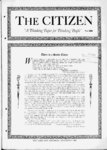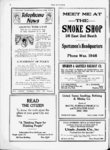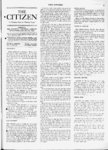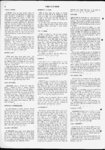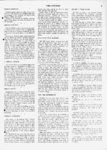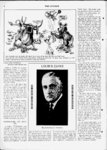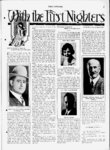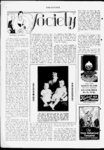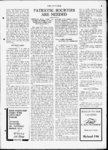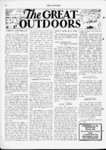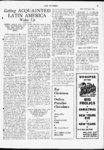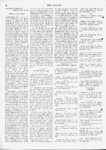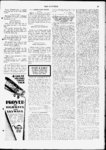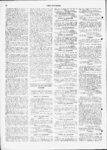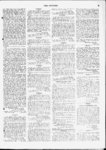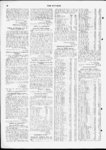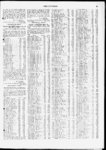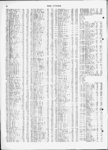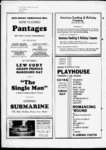| OCR Text |
Show THE CITIZEN 6 French cutlery. Still another workman specialized in handles and did assembling of the completed knife. was hand made. Ev-erythi- ng There was one craftsman, however, who made his knives complete. He purchased the German silver form plates which separate the blades and upon which the knife, is built. For the rest he forged his own blades and trinkets, made his own handles and charged his own prices. One paid him ten American dollars for a small, d pocket knife with a hie and one or two blades. One selected the forms, picked out the tortoise shell for the Handle, chose the types of blades, and if one liked might stand and watch the pencil-lik- e igots of fine steel forged into the blades. The old man he was nearly seventy was a master craftsman, an . three-blade- He handled the tools like a lover. His work showed a fineness of finish that could not be matched. He took great pride in the complicated pocket tool chests he had turned out. One he was working on at the time artist. Our Cartoonist sees the people (the sheep) in the grip of the Bulls and Bears on Wall Street Never has the Stock Market shown such activity as during the past year. It shows great Prosperity in the country with much ready money to purchase stocks and securities. CATES GETS NATIONAL BACKING FOR SECRETARY LOUIS S. CATES, vice president and general manager of the Utah Copper Company and the Bingham & Garfield Railway Company, and vice president of the National Copper Bank, is being backed by a national movement of the engineers for secretary of the interior, according to a special story from Washington to the Salt Lake Tribune. Cates is one of the biggest businessmen of the west and in every way is well qualified for this posi-toHe is a friend of Herbert Hoover and worked hard to secure support for Hoover in the recent election, as well as being very active in aiding to securing the nomination of Hoover on the Republcan ticket at Kansas City. Because of his unusual qualifications for such a position, Cates stands out prominently as the logical man. His backers point to his successful record in the world of mining and finance and his handling successfully of big enterprises, which is evidence sufficient for his fitness for the office of secretary of the interior, and they predict that if appointed he would be one of the outstanding men in the next cabinet. LOUIS S. CATES n. CRAFTSMANSHIP AND A DOZEN KILOMETERS from Chaumant, lies a little village known as Bresle. Ten general headquarters of the A. E. F., years ago it was the seat of an interpreters school, and American officers from G. H. Q. used to go down to lecture to the school and familiarize interpreters with the American accent and idion, so like English, yet so different. This whole had nearly thirty different tools attached to one handle, the whole thing no larger than an ordinary For this he was to receive about $100. Yet, even at these prices, when he had paid for his materials, and took account of the time required to turn out a finished knife, he could only make about sixty cents a day. At this same time, men in American automobile factories were standing in line before a moving work table which carried an endless succession of identical parts upon which each man performed a slight turn in ceaseless iteration. It was this method of the extreme subdivision of labor that gave us cheap cars, and has in some respects revolutionized modem industry. All are agreed that its efficiency is gained at the expense of workers who are subject to its dreary clasp-knif- e. monotony. The query will not down: Why cannot the two forms of industry be The quantity combined? system could be run at a profit on even shorter hours of labor. Let the workers be released before their days work has utterly sapped their energies. Then should they be trained, each in his own chosen handicraft, to which he turns when his factory work is over, a draft on which he may expend m whatever artistry he possesses, in which his personality may find expression, through which may be brought back into this machine-mad- e modem world the joyous beauty we prize so highly in the works of an older time. could If our French knife-makearn a livelihood working for three or four hours in an automobile factory, he could turn out his beautiful knives at a reasonable price, his artistry would be saved to enrich mankind and he himself be enabled to share the Q good things of modem civilization. May not something like this be one of the ways in which a mechanical age can be humanized and its soul saved? Minneapolis Journal. er Boomed for Secretary of Interior. region of France was given over to two industries gloves and cutlery. Every home in Bresle housed a workshop. There was a forge in every kitchen with a work bench in one window and a glove machine in the other. Pere made knives, Mme. la Mere sewed gloves. One man made table cutlery, another made blades for pocket knives, and another made scissors or cork screws or nail files or other trinkets so characteristic of M. le ( |

